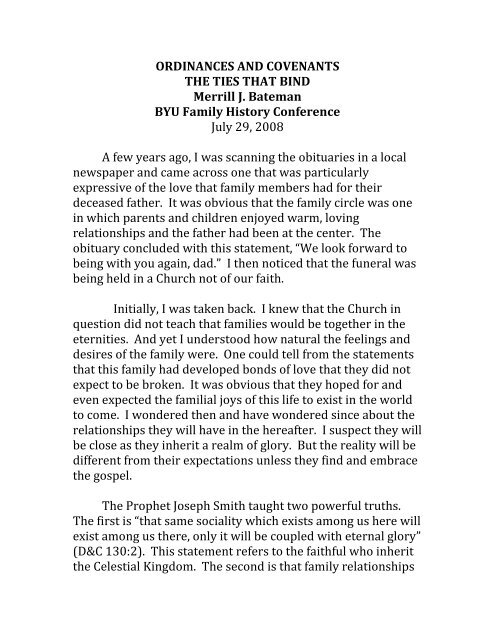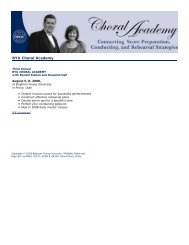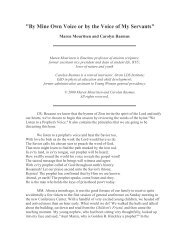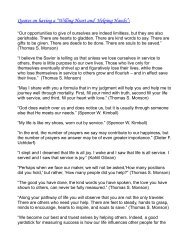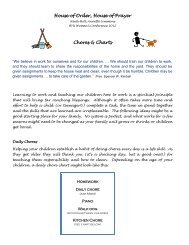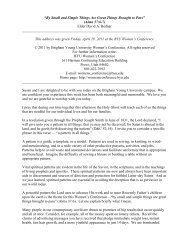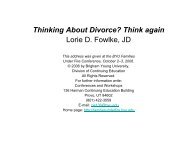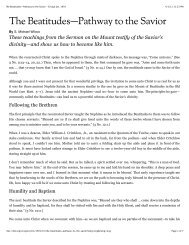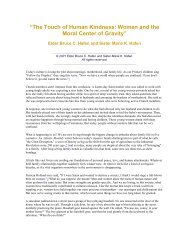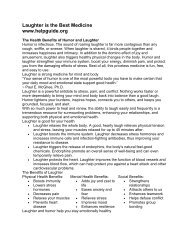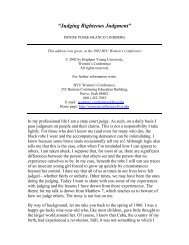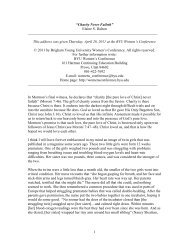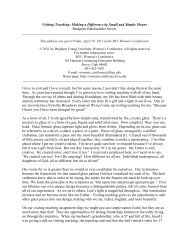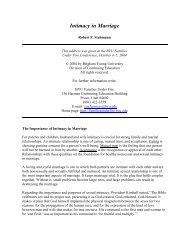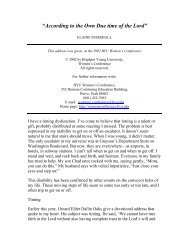ORDINANCES AND COVENANTS THE TIES THAT BIND Merrill J ...
ORDINANCES AND COVENANTS THE TIES THAT BIND Merrill J ...
ORDINANCES AND COVENANTS THE TIES THAT BIND Merrill J ...
You also want an ePaper? Increase the reach of your titles
YUMPU automatically turns print PDFs into web optimized ePapers that Google loves.
<strong>ORDINANCES</strong> <strong>AND</strong> <strong>COVENANTS</strong><br />
<strong>THE</strong> <strong>TIES</strong> <strong>THAT</strong> <strong>BIND</strong><br />
<strong>Merrill</strong> J. Bateman<br />
BYU Family History Conference<br />
July 29, 2008<br />
A few years ago, I was scanning the obituaries in a local<br />
newspaper and came across one that was particularly<br />
expressive of the love that family members had for their<br />
deceased father. It was obvious that the family circle was one<br />
in which parents and children enjoyed warm, loving<br />
relationships and the father had been at the center. The<br />
obituary concluded with this statement, “We look forward to<br />
being with you again, dad.” I then noticed that the funeral was<br />
being held in a Church not of our faith.<br />
Initially, I was taken back. I knew that the Church in<br />
question did not teach that families would be together in the<br />
eternities. And yet I understood how natural the feelings and<br />
desires of the family were. One could tell from the statements<br />
that this family had developed bonds of love that they did not<br />
expect to be broken. It was obvious that they hoped for and<br />
even expected the familial joys of this life to exist in the world<br />
to come. I wondered then and have wondered since about the<br />
relationships they will have in the hereafter. I suspect they will<br />
be close as they inherit a realm of glory. But the reality will be<br />
different from their expectations unless they find and embrace<br />
the gospel.<br />
The Prophet Joseph Smith taught two powerful truths.<br />
The first is “that same sociality which exists among us here will<br />
exist among us there, only it will be coupled with eternal glory”<br />
(D&C 130:2). This statement refers to the faithful who inherit<br />
the Celestial Kingdom. The second is that family relationships
are preserved through faithful adherence to gospel truths<br />
combined with the sealing ordinance of the temple. The Lord<br />
revealed that unless “a man (and woman) enter into this order<br />
of the priesthood [meaning the new and everlasting covenant<br />
of marriage] … they cannot be enlarged, but remain separately<br />
and singly, without exaltation, in their saved condition, to all<br />
eternity …” (D&C 131:2; 132:17). In other words, ordinances<br />
influence the relationships we have both in this world and in<br />
the world to come.<br />
As President Henry B. Eyring stated in a recent general<br />
conference, “… it is through the Church and the ordinances<br />
which are in it that the blessings of the sealing power reach<br />
into the spirit world … It is the sealing power and our<br />
knowledge of it which changes and transforms our family life<br />
here and our expectations for the joy of family life in the world<br />
to come.” 1<br />
As I read the obituary, I doubted if the family knew of<br />
these powerful truths and the sacred rites of the temple. My<br />
hope then and now is that they will learn about and embrace<br />
the Restored Gospel and its priesthood ordinances. Righteous<br />
living and the ordinances will help them realize their hopes for<br />
the future.<br />
In the Father’s Plan of Salvation, eternal progress is<br />
achieved through faithful adherence to gospel principles and<br />
acceptance of priesthood ordinances. Why are the ordinances<br />
so important? Ordinances are critical because they have the<br />
power to change our nature, to change us from telestial to<br />
celestial beings. The Lord revealed to the Prophet Joseph that<br />
“in the ordinances thereof [i.e., the ordinances of the<br />
Melchizedek Priesthood], the power of godliness is manifest.<br />
1 Henry B. Eyring, “The True and Living Church,” Ensign, May, 2008, 21.
And without the ordinances thereof, and the authority of the<br />
priesthood, the power of godliness is not manifest unto men in<br />
the flesh” (D&C 84:20-21).<br />
From the beginning, the Father has used priesthood<br />
ordinances and covenants to build relationships with His<br />
children and to prepare them to return to His presence. One of<br />
the earliest taught to man was the law of sacrifice. Soon after<br />
Adam and Eve entered mortality, the Lord spoke to them and<br />
commanded that they should offer the firstlings of their flocks<br />
as an offering unto the Lord. The scriptures state: “Adam was<br />
obedient unto the commandments of the Lord” (Moses 5:4-5).<br />
Later, an angel appeared unto Adam and asked, “Why dost thou<br />
offer sacrifices unto the Lord? And Adam said unto him: I<br />
know not, save the Lord commanded me. And then the angel<br />
spake, saying: This thing is a similitude of the sacrifice of the<br />
Only Begotten of the Father, which is full of grace and truth”<br />
(Moses 5:6-7).<br />
Through the ordinance, Adam was not only taught the<br />
meaning and purpose of the Savior’s atonement, but received<br />
blessings that would change his life. He learned that the Lord<br />
should come first, that he should seek the kingdom of God<br />
before all else. The ordinance taught him humility,<br />
unselfishness and a love for God. Covenants were an integral<br />
part of the sacrificial ordinance. Through the sacrifice, Adam<br />
expressed his faith in the Lord and his obedience. In return,<br />
God gave Adam, just as he did Abel, a witness of his<br />
righteousness and acceptance with the Lord (Hebrews 11:4).<br />
Adam also participated in the ordinance of baptism<br />
(Moses 6:52-53). Again, these ordinances brought to Adam<br />
and Eve the power to change their lives. The power emanating<br />
from priesthood ordinances is real, not imaginary. This power
combined with the Holy Spirit transforms men’s hearts and<br />
orchestrates a rebirth. The Prophet Joseph Smith said that the<br />
process of “being born again comes by the Spirit of God<br />
through ordinances.” 2<br />
When a person is prepared,<br />
participation in an ordinance is a spiritually transforming<br />
experience.<br />
Each ordinance of salvation and exaltation includes<br />
covenants that activate the Lord’s blessings as we abide our<br />
portion of the contract.<br />
Ordinances<br />
What is an ordinance? Elder Bruce R. McConkie<br />
differentiates between two types. The first type he calls<br />
“ordinance-commandments.” These are all of God’s decrees,<br />
laws, commandments, statutes and judgments. The Lord<br />
revealed to the Prophet Brigham Young that the saints are “to<br />
keep all the commandments and statutes of the Lord our God…<br />
And this shall be our covenant – that we will walk in all the<br />
ordinances of the Lord” (D&C 136:2-4). As Elder McConkie<br />
states, this is “the larger circle of ordinances.” 3<br />
The small circle consists of rites and ceremonies within<br />
the gospel such as baptism, laying on of hands for the Gift of<br />
the Holy Ghost, the sacrament, priesthood ordinations, temple<br />
ceremonies, etc. Most ordinances are essential for salvation<br />
and exaltation. The blessing of children and dedication of<br />
graves are given for the comfort and encouragement of the<br />
saints. 4<br />
2 Teachings of the Prophet Joseph Smith, compiled by Joseph Fielding Smith, 172.<br />
3 Bruce R. McConkie, Mormon Doctrine, Bookcraft Inc., Salt Lake City, Utah, 1958,<br />
496.<br />
4 Ibid., 496.
Covenants<br />
As stated earlier, the ordinances pertaining to salvation<br />
and exaltation include covenants as an integral part of the<br />
ceremony. Gospel covenants are agreements, contracts, or<br />
mutual promises between God and His children. Since gospel<br />
covenants originate with an all-wise God, He sets the terms and<br />
conditions of the contract. As we perform the ceremonies, we<br />
make covenants with him in an exchange of promises.<br />
The “new and everlasting covenant” is the fulness of the<br />
Restored Gospel and includes all of the covenants God has<br />
made with man and, therefore, all of the mutual promises<br />
between Him and man.<br />
In order to appreciate the relationship between<br />
ordinances and covenants and understand the “power of<br />
godliness” inherent in them, we will examine three types of<br />
ordinances.<br />
Baptism<br />
The first is baptism, an ordinance of salvation. The Savior<br />
told Nicodemus that “Except a man be born of water and of the<br />
Spirit, he cannot enter into the Kingdom of God” [John 3:5].<br />
One might ask, “Why is baptism necessary to enter God’s<br />
Kingdom and what is the “power of godliness” in baptism?”<br />
The “godly power” in baptism is the power to cleanse, the<br />
power to make clean. Baptism provides a conduit for one’s<br />
faith and repentance to access the Lord’s atoning powers of<br />
mercy and forgiveness. Cleanliness is an essential condition<br />
for entry into heaven. As the Lord taught Moses, ”Wherefore<br />
teach it unto your children, that all men, everywhere, must<br />
repent, or they can in nowise inherit the kingdom of God, for<br />
no unclean thing can dwell there…” (Moses 6:57).
Thus, baptism is essential because it activates the Lord’s<br />
atoning power in our lives to remove the stain of sin and opens<br />
the gate into the Celestial Kingdom. In the words of Isaiah, “…<br />
though your sins be as scarlet, they shall be as white as snow;<br />
though they be red like crimson, they shall be as wool” (Isaiah<br />
1:18). Cleansing is essential as it prepares us to be made holy,<br />
to be purified or sanctified.<br />
Through its cleansing power, baptism prepares one to<br />
receive the Gift of the Holy Ghost. The Holy Spirit brings the<br />
baptism of fire by which our sins are burned away (2 Nephi<br />
31:13-14).<br />
It is important to note the covenants associated with<br />
baptism. What do we as mortals promise God when we are<br />
baptized? First, baptism is a symbol of Christ’s death, burial<br />
and resurrection. Through baptism we express our faith in<br />
Jesus Christ and his atonement. We promise that we will take<br />
upon us His name and “come into the fold of God.” We commit<br />
to increase our faith through righteous living and repentance.<br />
We commit to “bear one another’s burdens … to mourn with<br />
those that mourn … to stand as witnesses of God at all times<br />
and in all things, and in all places” (Mosiah 18:8-9).<br />
What are the promises God makes to us when we are<br />
baptized? First, he promises to apply the atoning blood of<br />
Christ and cleanse us from sin as we exercise faith in the Father<br />
and the Son and repent. The Savior promises to draw us to<br />
Him, to redeem and sanctify us through the Holy Ghost that we<br />
may be lifted up by the Father and changed into Celestial<br />
beings [3 Nephi 27:14]. He promises to number us with those<br />
of the first resurrection, that [we] may have eternal life”<br />
[Mosiah 18:9].
What an incredible set of promises baptism puts in place!<br />
Baptism opens the gate and puts us on a path leading to the<br />
Celestial Kingdom. Baptism by water and by the Spirit has the<br />
godly power to cleanse.<br />
With the Gift of the Holy Ghost come other powers as<br />
well. The Holy Ghost has the power to guide us into truth, the<br />
power to sanctify us and change us into holy people, the power<br />
to comfort and teach, the power to testify that Jesus is the<br />
Christ. Faithfulness on our part coupled with these ordinances<br />
put us on the strait and narrow path leading to the presence of<br />
God.<br />
Priesthood Ordination<br />
The next ordinance to be examined is the priesthood<br />
ordination. What are the powers conferred in a priesthood<br />
ordination? It depends on the office! As we know, the<br />
priesthood is the power of God delegated to man to act in His<br />
behalf.<br />
In its fulness, the priesthood contains all of the powers<br />
God has seen fit to delegate including those of the temple<br />
ordinances. The priesthood has the power to direct the affairs<br />
of God’s kingdom on earth, the power to administer the<br />
ordinances to others. It has the power to bless and heal both<br />
physically and spiritually. It has the power to command the<br />
elements. Above all, the priesthood has the power to bind a<br />
man and a woman and their children into a family unit beyond<br />
the veil.<br />
What are the covenants associated with the priesthood<br />
ordination? Man promises to live a faithful life and to<br />
“magnify” his calling, to use his priesthood to bless others. He
promises to honor and sustain those called by the Lord to<br />
direct the Kingdom. He promises to receive Christ as his<br />
Savior and the Father as the God of all (D&C 33:37).<br />
What are Deity’s promises in the priesthood covenant?<br />
He promises the faithful man that he will become a son of<br />
Moses and Abraham and the elect of God. As such, they<br />
become inheritors of the promises made to the patriarchs and<br />
the prophets. Ultimately, the Father promises to make man a<br />
king and a priest to receive all that the Father has (D&C 84:38;<br />
76:56).<br />
Temple Ordinances<br />
The ordinances associated with the temple constitute the<br />
third area we will review. President Gordon B. Hinckley was<br />
not only the great temple builder of this dispensation, but was<br />
intimately acquainted with the ordinances. He was selected in<br />
the 1950’s by President David O. McKay to develop an<br />
approach that could be used in presenting the temple<br />
ordinances in temples that serve many languages. He directed<br />
the work that led to the films first used in the New Zealand and<br />
Swiss temples. Today’s presentation of the endowment is<br />
based on his work.<br />
At the beginning of his ministry as prophet, President<br />
Hinckley stated that the temple and “ordinances administered<br />
therein, represent the ultimate in our worship” and “the most<br />
profound expressions of our theology.” 5<br />
It is interesting to me<br />
that such profound expressions have been lost to most of<br />
Christianity even though there are numerous references to<br />
them in the scriptures. Temples and temple work are among<br />
the great evidences of the apostasy and the need for a<br />
5 Gordon B. Hinckley, “Of Missions, Temples, and Stewardship,” Ensign, November<br />
1995, 52-53.
Restoration of the Gospel. Nineteenth century Christendom<br />
had nothing like it. As I have wondered why there was so little<br />
knowledge of temple ordinances in the Christian world, I have<br />
come to the conclusion that the world knows little about them<br />
because these truths were among the first to be lost. Temple<br />
ordinances and the doctrine associated with them were lost<br />
very early in the apostasy. Temples and temple ordinances are<br />
the direct prerogative of the prophet who heads the Church.<br />
Peter, James and John participated in the transfer of these keys<br />
from the Prophet Elijah (Matthew 16:18-20; 17:1-3: 18:18;<br />
John 1:14). Once the apostles were gone, these keys were<br />
withdrawn and associated ordinances effectively ceased.<br />
In fact, the Apostle John, the last apostle in the Meridian<br />
of Time, tried to forestall the apostasy and reclaim members of<br />
the seven churches in Asia by reminding them of the blessings<br />
of priesthood ordinances. He wrote the following to them:<br />
And from Jesus Christ, who is the faithful witness, and the<br />
first begotten of the dead, and the prince of the kings of<br />
the earth. Unto him that loved us, and washed us from<br />
our sins in his own blood.<br />
And hath made us kings and priests unto God and his<br />
Father; to him be glory and dominion forever and ever.<br />
Amen (Revelations 1:5-6).<br />
It is clear that John used the blessings that come from<br />
baptism and the temple to remind the saints of what they will<br />
give up if they continue in their wayward pursuits.<br />
Unfortunately, most of the people in these branches had<br />
become apostate and did not respond to his plea. Within a<br />
short time, all of the apostles were gone and temple work with<br />
them.
Just as baptism, the Gift of the Holy Ghost and the<br />
priesthood are meant to bring us to Christ, so the main purpose<br />
of the temple is to sanctify and prepare us to stand in the<br />
presence of the Father and the Son and to create eternal<br />
families.<br />
Temple ordinances instruct us in the purposes of the<br />
Creation, the Fall and the Atonement. From them we learn<br />
why this earth was created, why we are here and what lies<br />
beyond the veil. They are the most sacred ceremonies on<br />
earth.<br />
Again we ask, “What is the power in these ordinances and<br />
what are the covenants associated with the temple?” Although<br />
we do not talk about the ordinances outside the temple, there<br />
are some general statements that can be made with regard to<br />
the power in temple ordinances and the blessings that flow<br />
from them.<br />
First, baptism opens a gate that puts us on a path into the<br />
Celestial Kingdom. As we travel this strait and narrow path,<br />
we eventually come to a fork in the road and additional choices<br />
are required. These choices involve the temple. If we choose<br />
to enter the temple and partake of its ordinances, another gate<br />
is opened which leads to an even higher path. Faithful<br />
adherence to temple ordinances, including the sealing<br />
ordinance of marriage, leads to the highest degree of the<br />
Celestial Kingdom. Without the highest ordinances, a person<br />
inherits a lower degree (D&C 131:1-4).<br />
Temple ordinances have additional powers. These<br />
powers include cleansing, the power to resist Satan’s<br />
temptations, an increased sensitivity to the Holy Spirit,
lessings of health, the power to sanctify, the power to make us<br />
“kings and priests unto God,” the power to bind men, women<br />
and children into families forever (Revelations 1:6; D&C<br />
132:19). Through temple ordinances, we are promised the<br />
power of eternal increase in the resurrection (D&C 131:4;<br />
132:19). Temple ordinances bring a “fulness of the Holy<br />
Ghost,” a “fulness of the Priesthood,” and a “fulness of glory”<br />
(D&C 109:15; 124:28; 132:6, 19).<br />
In order to receive these blessings, we promise to be<br />
faithful and loyal to the Lord, to be faithful to our companions,<br />
to dedicate our lives as individuals and as families to the<br />
building up of the Kingdom of God on earth. We promise to<br />
become a Zion people with the “fire of the covenant” burning<br />
within us. 6<br />
Faith, Power and Hope in the Ordinances<br />
One of the ways in which the doctrine and the ordinances<br />
bring power into our lives is through the hope they engender.<br />
A few months ago in sacrament meeting, a priesthood leader<br />
shared an experience he had as a young missionary in Brazil.<br />
As I listened, the Spirit reconfirmed my feelings of the power,<br />
of the hope, of the faith that comes with an understanding of<br />
the gospel plan and its priesthood ordinances.<br />
While serving as a missionary with his companion in<br />
Brazil, the two missionaries met a wonderful, young family<br />
who were second generation Japanese-Brazilians. They had<br />
three young children at the time and invited the missionaries<br />
into their home.<br />
6 Brigham Young, Journal History of The Church of Jesus Christ of Latter-day Saints,<br />
September 28, 1846, 5.
On the third discussion, the missionaries began teaching<br />
them about the Savior’s atonement, the resurrection and the<br />
Plan of Salvation. During the presentation, the mother began<br />
to cry. Initially, the missionaries were concerned that they had<br />
offended her in some way and inquired as to her problem. She<br />
then shared the following story.<br />
“Their first child was a beautiful little girl who had<br />
brought joy and happiness into their young married life.<br />
Suddenly, she became sick and died and they were heart<br />
broken. A year after the death and burial of the young child,<br />
the couple received a notice that the cemetery was being<br />
moved and that they would have to retrieve and relocate the<br />
casket. Because of the mother’s desire to see her angel<br />
daughter one more time, she asked that the casket be opened.<br />
As she looked at her daughter’s degenerated remains, she was<br />
shocked. The experience was so devastating that it destroyed<br />
any hope of a future reunion and association. Since then, she<br />
had lived in complete despair, devoid of any hope.”<br />
As the missionaries explained the Plan of Salvation, the<br />
mission of the Savior, and the reality of the resurrection, the<br />
mother was touched by the Spirit and became overwhelmed<br />
with gratitude and appreciation. As the couple learned more<br />
about the Savior, the blessing of eternal families and the<br />
restoration of the sealing power, hope returned and they were<br />
baptized. When the missionary was released from his mission,<br />
the family gave him this picture of the family as a memory of<br />
the special time when hope returned to their lives. 7<br />
Ordinances and Spiritual Experiences<br />
Participation in the ordinances is meant to be a spiritual<br />
experience. This is true for all ordinances, but especially for<br />
7 Richard T. Jackson, letter sharing missionary experience.
the rites of the temple. Think of the experience that the<br />
children of Israel might have had as they were offered the<br />
fulness of the gospel including the temple ordinances.<br />
Once Moses had brought the children of Israel to the foot<br />
of Mount Sinai, the Lord called him to the top of the mountain<br />
in order to give him instructions. The Lord told Moses that if<br />
Israel would obey the covenants the Lord was about to make<br />
with them, He would cause Israel to become a “peculiar<br />
treasure … a kingdom of priests, and an holy nation.” Moses<br />
returned to the camp and called the elders of the people<br />
together and asked if they wanted to make covenants with the<br />
Lord. The people answered, “All that the Lord hath spoken we<br />
will do.” Moses returned to the Lord with the people’s report.<br />
The Lord instructed Moses as to how he should prepare the<br />
people. The Lord said, “Go unto the people, and sanctify them<br />
today and tomorrow, and let them wash their clothes. And be<br />
ready against the third day: for the Lord will come down in the<br />
sight of all the people upon mount Sinai.” (Exodus 19:5-11).<br />
Can you imagine the spiritual feast that was offered to Jacob’s<br />
posterity.<br />
Moses went down from the mount and sanctified them<br />
and had them wash their clothes. On the third day, the Lord<br />
came to the top of the mount in fire. There was thundering and<br />
lightning and a thick cloud that fell upon the mount. The Lord<br />
divided the mountain into three parts: the foot, the mid-point<br />
and the top. The children of Israel were brought to the foot of<br />
the mountain, Moses and 70 elders of Israel were called to the<br />
mid-point and Moses again returned to the top. The mountain<br />
had become a temple.<br />
Moses was given a pair of tablets to take down to the<br />
people. The first set contained the fulness of the gospel and the
emainder of the covenants the Lord wanted to make with<br />
Israel. Unfortunately, when Moses returned the people were<br />
worshipping a golden calf and living far below the standards<br />
set for the blessings offered. The tablets were broken and<br />
eventually Moses was given another set containing the lesser<br />
law, a schoolmaster designed to bring them to Christ (Galatians<br />
3:24).<br />
The lesson learned is that people need to prepare<br />
themselves and remain clean in order for one to receive a<br />
spiritual experience as one participates in a priesthood<br />
ordinance. Fasting and prayer are helpful in this regard. It<br />
also helps if one understands the ordinance. For example,<br />
temple ordinances are more than a story, more than<br />
instruction. They are designed for individuals to engage the<br />
Holy Spirit, to deepen their faith, and to make covenants with<br />
the Lord.<br />
A few months ago, a sister came to the Provo Temple with<br />
a box of family file cards. As she crossed the threshold of the<br />
temple, she received an impression to look at the cards once<br />
more. There were many cards containing information on her<br />
ancestors covering a period of three hundred years. As she<br />
looked at the cards she noticed the oldest relatives were at the<br />
bottom with the youngest on top. The impression came to<br />
reverse the order. Her impression was that those who had<br />
waited the longest should be first. She felt a strong interest<br />
from the other side of the veil given the significance of what<br />
was about to take place.<br />
Many years ago while fulfilling an assignment in West<br />
Africa, I met a wonderful, LDS woman who was also there. She<br />
had retired from Brigham Young University and was<br />
developing a Home Economics program at the University of
Ghana. During the summer, she told me the story of her life<br />
and her goals upon her return home.<br />
As a young woman in her twenties, she had received a<br />
bachelor’s degree from the University of Utah and had married<br />
a man from Sandy, Utah. He was a farmer and they had begun<br />
what they hoped would be a long life together. After a year or<br />
so, a young baby boy came into their home. A few months later<br />
she realized that she was expecting again. One day her<br />
husband came in from the farm very ill. Within a short time,<br />
the pain was intense and by nightfall, he had passed away. He<br />
died of a ruptured appendix.<br />
A few months later, a second son was born. With two<br />
children to care for, Virginia Cutler knew that she had to find<br />
work. She spoke with the bishop. He told her to seek out her<br />
professors at the University of Utah and see if they had any<br />
counsel for her. As she talked with the professsors, they said,<br />
“You were an excellent student. What you need is a master’s<br />
degree. We believe Stanford would admit you and provide<br />
financial assistance. Sister Cutler applied and was accepted.<br />
As she told the story, she indicated that it took longer to obtain<br />
the master’s degree because she wanted to be with the<br />
children as much as possible. After some time she finished the<br />
degree and her professors at Stanford said, “You have done so<br />
well here we believe you should seek a Ph. D. It will increase<br />
your earning power. If you apply to Cornell, there is a good<br />
chance that they will admit you and provide financial<br />
assistance as we have. Sister Cutler thought about the<br />
suggestion and decided to apply. She was accepted and aid<br />
was proffered.<br />
Again, it took her longer than normal to finish the<br />
doctorate because she wanted to spend time with her sons.
Eventually, she finished and obtained good employment.<br />
When the boys had grown, she decided to accept an<br />
assignment with the Ford Foundation in Asia and then with<br />
other international organizations. For a few years she taught<br />
at the University of Utah and eventually became dean of the<br />
College of Family Living and BYU. Through most of her adult<br />
life, however, she had not lived near a temple and temple<br />
attendance had not been a key part of her life.<br />
One evening, just prior to her leaving Ghana, she and I<br />
had dinner with a few other friends. During the evening she<br />
shared with me her goals upon returning to Provo. She said,<br />
“You know I have not lived near a temple most of my adult life.<br />
I have just learned that the First Presidency has announced a<br />
new temple in Provo which will should be finished with a<br />
couple of years. I have thought about my life and I now desire<br />
to become a faithful temple patron. In fact, I want to do as<br />
many endowments for my sisters on the other side of the veil<br />
equal to the number of weeks since I received my first temple<br />
recommend.” It had been fifty years.<br />
She returned to Provo and I spent a number of years<br />
working for international businesses and other organizations.<br />
I returned to Provo in the summer of 1980, more than a decade<br />
later. Soon after my returned, I was called to be a stake<br />
president in the Provo Utah Sharon East Stake. One of the first<br />
persons to come for a temple interview was Sister Cutler. As<br />
we finished the interview, she said, “President, do you<br />
remember our conversation that last evening in Africa? Do you<br />
remember the goal I set for myself. I answered that I did<br />
remember and asked, “How are you doing?” She responded, “I<br />
have almost finished. I will surpass the 2,500 mark in a few<br />
weeks time.
She then looked me straight in the eye and said, “May I<br />
share with you a special experience I had a few weeks ago? I<br />
was in the temple in an endowment session. I closed my eyes<br />
and began thinking about all of the sisters for whom I had done<br />
the work. As I thought about them, I said to myself, ‘I wonder if<br />
they know what I have been doing? I wonder if they will be on<br />
the other side of the veil to greet me when I pass on? I hope<br />
so!’ And then the thought came, ‘I wonder if my husband<br />
knows what I have been doing? I wonder if he has been an<br />
instrument in teaching them the gospel and preparing them for<br />
the ordinances?’” She then said, “As this thought came to me, I<br />
suddenly, in my mind’s eye, saw the veil part and a man’s hand<br />
reach through the veil to me. It was a young man’s hand. It<br />
was my husband’s hand. I had not seen it for more than 60<br />
years! I knew he was there! I knew he knew what I was doing!<br />
He had been preparing them! I believe many of them will be<br />
with him at the veil to greet me when my time comes.”<br />
Sister Cutler died a few years later. I have thought often<br />
of the wonderful assembly of sisters that greeted her. I suspect<br />
her husband was there to introduce them. What a wonderful<br />
day that must have been.<br />
Yes, ordinances are designed to provide a spiritual<br />
experience and the blessings promised are real. The<br />
ordinances prepare us to enter the presence of the Father and<br />
the Son.<br />
Conclusion<br />
In conclusion, it is my hope that all of us will appreciate<br />
the great Plan of Salvation and the blessings it provides. In the<br />
Lord’s perfect plan, there is opportunity for everyone in that<br />
those who did not receive the opportunity to hear the gospel in<br />
this life are not forgotten. It behooves all of us to become
Saviors on Mount Zion (Obadiah 1:21; D&C 103:9-10).<br />
Missionary work, family history and temple work are the keys.<br />
Everyone must partake of the ordinances in order to<br />
receive a fulness. As the Lord revealed to the Prophet Joseph,<br />
“… in the ordinances thereof, the power of godliness is<br />
manifest” (D&C 84:29). The ordinances have the power to<br />
cleanse, the power to sanctify, the power to lift us up to the<br />
Father. In the sealing ordinance, eternal families are created.<br />
As stated earlier, the saving and exalting ordinances<br />
include covenants. If we are true to these covenants, if we do<br />
not defile our garments, the blessings offered the saints in<br />
Sardis will be ours. The Savior will be able to say to us as He<br />
said to them, “… they shall walk with me in white: for they are<br />
worthy” (Revelations 3:4).<br />
Unfortunately when Moses returned, he found the people<br />
worshipping a golden calf and living far below the standards<br />
set to enter into the Lord’s presence.


